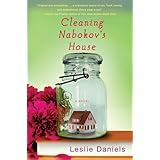So this woman came up with a copy of a Wilbur Smith novel and wanted to know if I'd ever read him. Of course, I did my famous bait and switch dance and admitted that no, I hadn't read Wilbur, but that I've heard wonderful things about him. She didn't really care if I'd read him anyway, she only wanted to know what the next title was in that particular series, which was easier to discover than it's ever been since Jessica showed us what great info Wikipedia has on reading in a series. Sorry reference librarians but it's true! Google it! Ha.
Anyway, I was thinking "what if she'd asked me what I was reading now?" She'd have probably looked at me like I had three heads. The answer is Jane Gardam. The title, Old Filth. Fess up, how many of you have read her? Heard of her? Well, you know. I hadn't either. But, as I follow about 30 other book blogs written by some pretty amazing amateurs, and then read how many review magazines and websites, certain names come up again and again and one's curiosity gets the best of them.
Gardam is in that cadre of marvelously dry, witty, British women that my sister, my mother and I would read. I'm thinking Anita Brookner, Margaret Drabble. She's been shortlisted for or has won all the prestigious British awards, the Whitbread, the Man Booker, the Orange Prize, but still it seems that these types of authors get no respect in this country. Of course, she's also published by Europa editions with whom you know I'm having a cover love affair.
 Old Filth is an insider nickname for a very sad old man by the name of Edward Feathers. I say sad in that his successful life as a barrister has left him wealthily retired, widowed, and alone, back in England after years in Hong Kong. He and his wife Betty were childless and one gathers that there's an interesting back story to that situation which will eventually come clear. Though married for over fifty years they seem to know nothing about each other. At least he knows nothing about her. A follow up book, The Man in the Wooden Hat, is written from Betty's perspective and I can't wait to get into that!
Old Filth is an insider nickname for a very sad old man by the name of Edward Feathers. I say sad in that his successful life as a barrister has left him wealthily retired, widowed, and alone, back in England after years in Hong Kong. He and his wife Betty were childless and one gathers that there's an interesting back story to that situation which will eventually come clear. Though married for over fifty years they seem to know nothing about each other. At least he knows nothing about her. A follow up book, The Man in the Wooden Hat, is written from Betty's perspective and I can't wait to get into that!The irony is that Eddie's life was, in fact, amazingly full, but his attempts at connection were thwarted by bad timing and worse luck. Born in Malaysia where his parents were stationed at the height of The Raj, think of the wonderful Raj Quartet, Eddie was motherless within a few hours of his birth. His father, a shell shocked WW I veteran who was barely holding it together before the death of his wife, refuses to acknowledge his son, so Eddie is happily left to be loved by the wet nurse and her family.
As he approaches school age though, father decides that Eddie should be sent back to England to be educated and the scenes of his removal from the indigenous family that he's attached himself to are heartrending. Ms. Gardam has a gorgeous way with words but, even more, a razor sharp insight into the effects of British imperialism on those who had to live through it on both sides of "the pond."
Her novel throws a clear-eyed light on the British private school system as Eddie thrives in his studies and makes fast friends, until World War II intervenes.
So why does this book appeal to me? Why am I also currently listening to - don't faint now - a Sandra Brown novel? Why am I putting off the only book on my kitchen counter that everyone is talking about - The Paris Wife? And we're back to the first question, why do we read? Sometimes it has to be to learn how a great writer puts words together on the page and comes up with critical acclaim. Other times it's just to travel to a new place in a different time. Often it's just to relax after a particularly painful reading experience. Perhaps the more astute question is "how can we not read?"


